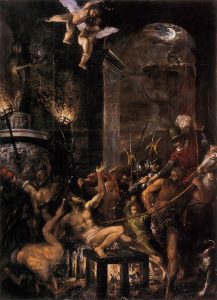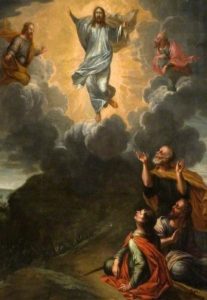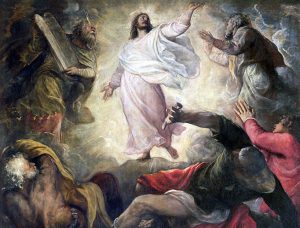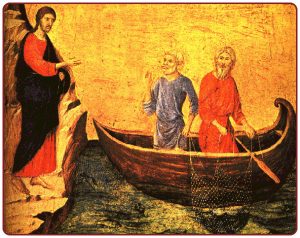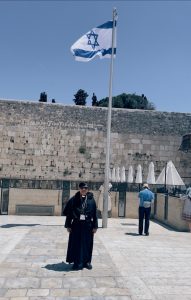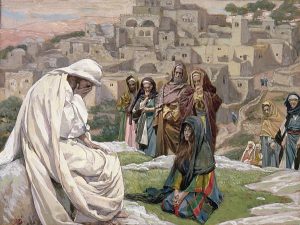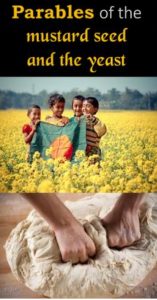Nowadays I have never heard of anyone who can walk on the water, except Jesus. In the movie “The Chosen,” the director and the whole cast were able to present the scene of Jesus walking on the water. It is a dramatic and realistic scene and beautifully done. I am so amazed at how they did it. By coincidence, I saw a video of how they filmed it, and the director revealed how they made it so real. It was inside a huge water storage container filled with water. Through technology, they created sound effects and used a floating device for the main actor to make believe that he is walking on the water. The cinematography is indeed wonderfully amazing. Movies are made now to let the audience enjoy the virtual effects on the big screen as if the event is actually happening in front of us. It portrays the most exciting techniques to captivate viewers’ emotions and feelings. It is a movie we must watch.
Today is the 19th Sunday in Ordinary Time. This is summertime, a time for family bonding, picnics, or outdoor activities. Let us be careful swimming in the sea or lake and be mindful that we cannot walk on the water, only Jesus can. However, just listen to Jesus for a moment as He says, “Take courage, it is I; do not be afraid…Come.”
In our first reading, taken from the first book of Kings, Elijah had his own encounter with God on the mountain. To understand Elijah’s journey, we read the previous chapters of this book, and then we have a deep interest in how he managed his life at Horeb. While he was resting and hiding in a cave, the Lord said to him, “Go outside and stand before the Lord, the Lord will be passing by.” Elijah stood outside where he was confronted with a holy mess of natural winds that are breaking rocks to bits, an earthquake, and an all-consuming fire. Somehow, he was patiently waiting until his persistence paid off. “After the fire there was a tiny whispering sound.” The Lord passed by. There it took place; God sent him on a mission to fulfill.
From the second reading, St. Paul expresses deep sorrow and disappointment for the people of Israel who refused to accept Jesus as the fulfillment of God’s promise. St. Paul says, “I feel great sorrow and anguish for my people, the Israelite brothers, and sisters because they have not believed Jesus is the Messiah.” I believe that the heart of Paul was not only broken, but our hearts as well. We feel the sorrow to know that our children don’t attend Mass, something that is completely a disconnect from God. We have seen our families walk away from the Lord. We grieve their absence here.
Our gospel today narrates a story to us about the apostles who were sent by Jesus in a boat. The experience of the apostles had them crossing to the other side of the Lake, with winds and waves disturbing the calmness of their journey, and they succumbed in fear.
Let us keep in mind the challenges of this gospel to this contemporary world:
First, we experience a similar call from the Lord amidst chaos in the world we are in. The world is dangerous without Christ in our hearts. Though we are confronted with the challenge, we stay calm and never panic, for the Lord continues to be present. Monsters and evils have no power lurking over us so deeply because Jesus has ultimate power to defeat them.
Second, as we go through life, Jesus journeys with us. Many times, we are unable to recognize Him because we are blinded by the clouds of fear and anxieties. Our faith in the Lord is our eyes to recognize Him for He never abandons us. If we are neglectful of opening our eyes with faith in moments of sorrows, difficulties, and pain, then we become like Peter, who had weak faith and started drowning.
Third, let us allow ourselves to be invited by Jesus who speaks: “Take courage, it is I; do not be afraid…Come,” and learn to rely upon Him. This is unlike Peter, who was blinded by his fear. When dark spirits control us, seek Jesus’ comforting call through our prayers that spring out safety and stability of our life. Overcoming our fear draws us near to Jesus.
The Church calls for Synodality; we journey together, we walk together, we are in communion towards God. When all feels lost and desperate, Jesus appears, walking not on the water but together with us. We cannot walk alone, disturbed by the terror of evil, and our survival depends on how we recognize Jesus, the Lord.
Where is God’s presence? Not in the turmoil of natural calamities, but we find Jesus in the silence of our hearts in prayer. Therefore, we pray to be open to God’s presence and to be attentive to His calling that is beyond our present comfort.
God bless you.
Fr. Arlon, osa
———————————-
El Dictado del Corazón: Decimonoveno Domingo del Tiempo Ordinario, año A
- 1 Reyes 19:9a, 11-13a
- Salmo 85:9, 10, 11-12, 13-14
- Romanos 9:1-5
- Mateo 14:22-33
Hoy en día nunca e escuchado de que alguien pueda caminar sobre el agua, solo Jesús. En la película “Los elegidos”, el director y todo el elenco pudieron presentar la escena de Jesús caminando sobre el agua. Es una escena dramática y realista y bellamente hecha. Estoy tan asombrado de cómo lo hicieron. Por coincidencia, vi un video de cómo lo filmaron y el director reveló cómo lo hicieron tan real. Fue dentro del enorme contenedor de agua, o dentro de un depósito de agua gigante, donde a través de la tecnología, crearon efectos de sonido y utilizaron un dispositivo flotante para el actor principal, para hacer creer que está caminando sobre el agua. La cinematografía es de hecho maravillosamente sorprendente. Ahora se hacen películas para que la audiencia disfrute de los efectos virtuales como si el evento sucediera frente a la pantalla grande. Retrata las técnicas más emocionantes para cautivar las emociones y sentimientos de los espectadores. Es una película que recomiendo ver.
Hoy es el Decimonoveno Domingo del Tiempo Ordinario. Este es el verano, un momento para la unión familiar, picnics o actividades al aire libre. Tengamos cuidado al nadar en el mar o en el lago, pero tengamos más cuidado de no tratar de caminar sobre el agua, solo Jesús puede hacerlo. Sin embargo, solo escuche a Jesús por un momento, Él dice: “Ánimo, soy yo; no tengas miedo… Ven.”
En la primera lectura tomada del primer libro de Reyes, Elías tuvo su encuentro con Dios en la montaña. Para comprender el viaje de Elías, leemos los capítulos anteriores de este libro y luego tenemos un profundo entendimiento, en cómo manejó su vida en Horeb. Mientras descansaba y se escondía en una cueva. El Señor le dijo: “Sal fuera y ponte delante del Señor, el Señor pasará”. Elijah se quedó afuera, luego se enfrentó a un desastre sagrado de vientos naturales que rompían rocas en pedazos, un terremoto y un fuego que todo lo consumía. De alguna manera, estaba esperando pacientemente hasta que su persistencia valiera la pena. “Después del incendio, hubo un pequeño susurro”. El Señor pasó. Allí tuvo lugar el envío de Dios para una misión a cumplir.
Desde la segunda lectura, San Pablo expresa un profundo dolor y desilusión por el pueblo de Israel que se negó a aceptar a Jesús como el cumplimiento de la promesa de Dios. San Pablo dice: “Siento gran dolor y angustia por mi pueblo, hermanos y hermanas israelitas porque no han creído que Jesús es el Mesías”. Yo creo que el corazón de Pablo no solo estaba quebrantado sino también el nuestro. Sentimos el dolor de saber que nuestros hijos no asisten a Misa, algo que está completamente desconectado de Dios. Hemos visto a nuestras familias alejarse del Señor. Lamentamos su ausencia aquí.
Nuestro evangelio de hoy nos narra una historia sobre los apóstoles que fueron enviados por Jesús en una barca. La experiencia de los apóstoles cruzando del otro lado del lago, los vientos y las olas perturban la tranquilidad de su viaje, pero sucumben al miedo.
Tengamos en cuenta los desafíos de este evangelio para este mundo contemporáneo:
Primero, experimentamos un llamado similar del Señor en medio del caos en el mundo en el que estamos. El mundo es peligroso sin Cristo en nuestros corazones. Aunque nos enfrentamos al desafío, mantenemos la calma y nunca entramos en pánico porque el Señor sigue estando presente. Los monstruos y los males no tienen poder para acecharnos tan profundamente porque Jesús tiene el máximo poder para vencerlos.
En segundo lugar, a medida que avanzamos por la vida, Jesús viaja con nosotros. Muchas veces somos incapaces de reconocerlo y estamos cegados por las nubes del miedo y la ansiedad. Nuestra fe en el Señor son nuestros ojos para reconocerlo porque Él nunca nos abandona, somos negligentes en abrir los ojos de la fe en los momentos de tristeza, dificultad y dolor.
Tercero, dejémonos invitar por Jesús que habla: “”Tranquilícense y no teman. Soy yo… Ven,” y aprender a confiar en Él. A diferencia de Pedro, que estaba cegado por sus miedos. Cuando los espíritus oscuros nos controlan, busquemos el llamado consolador de Jesús a través de nuestras oraciones que brotan la seguridad y la estabilidad de nuestra vida. Superar nuestros miedos nos acerca a Jesús.
La Iglesia llama a la sinodalidad, juntos en la jornada, caminamos juntos y estamos en comunión con Dios. Cuando todo se siente perdido y desesperado, aparece Jesús, caminando no sobre el agua sino junto a nosotros. No podemos caminar solos, perturbados por el terror del mal y nuestra supervivencia depende de cómo reconozcamos que Jesús, es el Señor.
¿Dónde está la presencia de Dios? No en la confusión de las calamidades naturales, sino que encontramos a Jesús en el silencio de nuestros corazones en oración. Por lo tanto, oramos para estar abiertos a la presencia de Dios y estar atentos a su llamado que está más allá de nuestra comodidad actual.
Dios los bendiga.
Padre Arlón, osa

